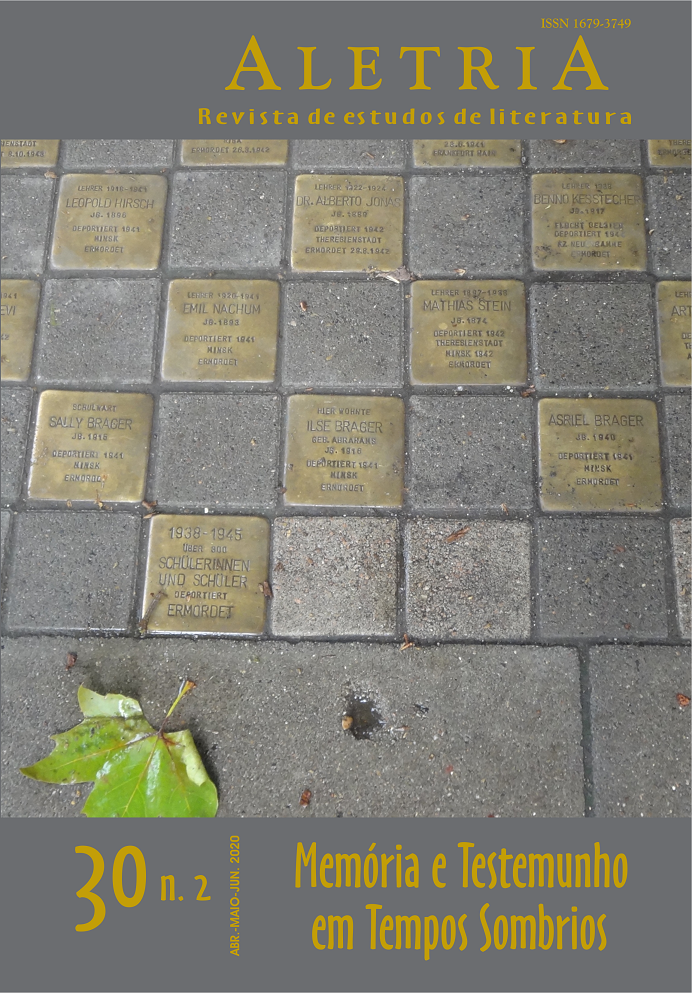From Art as a Science to the Death of Poetry
Hermann Broch in Dialogue with Scientific Thought in The Sleepwalkers (1931-1932) and The Death of Virgil (1945)
DOI:
https://doi.org/10.35699/2317-2096.2020.22090Palabras clave:
Hermann Broch, The Sleepwalkers, The Death of Virgil, scientific thoughtResumen
This article reflects on the contacts and dialogues between literature and scientific thought in the works of Austrian writer Hermann Broch in the first half of the 20th century. His first novel, The Sleepwalkers [Die Schlafwandler] (1931-1932), points to certain interpretations, allusions and similarities in connection with thinkers such as Max Weber, Walter Benjamin and Hannah Arendt, which suggest the incorporation of literature to scientific and philosophical knowledge. Conversely, in his last fiction work, The Death of Virgil [Der Tod des Vergil] (1945), Broch seems to question and even to doubt the importance of literature as a way of reflecting on contemporary life. While prioritizing Broch’s early works, this article follows his trajectory as he incorporates philosophical, scientific, and religious considerations to fiction, while reflecting on the times in which he lived.
Descargas
Referencias
ARENDT, Hannah. Men in Dark Times. New York: A Haverst Book, 1970.
ARENDT, Hannah. The Achievement of Hermann Broch. The Kenyon Review, Gambier, OH, v. 11, n. 3, p. 476-483, Summer, 1949.
BENJAMIN, Walter. Selected Writings. Cambridge; London: The Belknap Press of Harvard University Press, 1999. v. 2 (1927-1934).
BROCH, Hermann. Geist and Zeitgeist: Six Essays by Hermann Broch. Translated by John Hargraves. New York: Counterpoint, 2002.
BROCH, Hermann. The Death of Virgil. Translated by Jean Starr Untermeyer. New York: The Grosset & Dunlap, 1965.
BROCH, Hermann. The Sleepwalkers. Translated by Willa and Edwin Muir. San Francisco: North Point Press, 1985.
CANETTI, Elias. The Play of the Eyes. Ney York: Farrar Straus Giroux, 1987.
CANTINHO, Maria João. Hermann Broch: o poeta relutante. Revista de História das Ideias, Coimbra, n. 34, p. 475-490, maio 2003. DOI: https://doi.org/10.14195/2183-8925_24_14
CASSIRER, Sidonie. Broch’s Early Writings. PMLA, [S.l.], v. 75, n. 4 p. 453-462, 1960. DOI: https://doi.org/10.2307/460608
COSTA LIMA, Luiz. História. Ficção. Literatura. São Paulo: Companhia das Letras, 2006.
HARDIN JR., James N. The Theme of Salvation in the Novels of Hermann Broch. PMLA, [S.l.], v. 85, n. 2, p. 219-227, 1970. DOI: https://doi.org/10.2307/1261396
HARRINGTON, Austin. Hermann Broch as a reader of Max Weber: Protestantism, rationalization and the “disintegration of values”. History of the Human Sciences, [S.l.], v. 19, n. 4, p. 1-18, 2006. DOI: https://doi.org/10.1177/0952695106069665
HEROLD, Thomas. The Paradox of Time in Hermann Broch’s Die Schlafwandler. Oxford German Studies, Oxford, v. 43, n. 2, p. 156-171, 2014. DOI: https://doi.org/10.1179/0078719114Z.00000000055
LACAPRA, Dominick. History & Criticism. Ithaca; London: Cornell University Press, 1985.
LEPENIES, Wolf. As três culturas. São Paulo: Edusp, 1996.
LOOS, Adolf. Ornament and crime. In: CONRADS, Ulrich (ed.). Programs and Manifestoes on 20th-Century. Cambridge: The MIT Press, 1971. p. 19-24.
OSTERLE, Heinz. Die Schlafwandler: Revolution and Apocalypse. PMLA, [S.l.], v. 86, n. 5, p. 946-958, 1971. DOI: https://doi.org/10.2307/461078
WEBER, Max. The Protestant Ethic and the Spirit of Capitalism. Translated by Talcott Parsons. London; New York: Routledge, 2005. DOI: https://doi.org/10.4324/9780203995808
WEIDNER, Daniel. Neither here nor there – Hermann Broch’s Writing in Exile. Yearbook for European Jewish Literature Studies, Berlin, v. 2, issue 1, p. 171-194, 2015. DOI: https://doi.org/10.1515/yejls-2015-0011
ZIOLKOWSKI, Theodore. Hermann Broch and Relativity in Fiction. Wisconsin Studies in Contemporary Literature, Madison, v. 8, n. 3, p. 365-376, 1967. DOI: https://doi.org/10.2307/1207193
Descargas
Publicado
Número
Sección
Licencia
Derechos de autor 2020 Eduardo Wright Cardoso (Autor)

Esta obra está bajo una licencia internacional Creative Commons Atribución 4.0.
Authors who publish with this journal agree to the following terms:Authors retain copyright and grant the journal right of first publication with the work simultaneously licensed under a Creative Commons Attribution Non-Commercial No Derivatives License that allows others to share the work with an acknowledgement of the work's authorship and initial publication in this journal.Authors are able to enter into separate, additional contractual arrangements for the non-exclusive distribution of the journal's published version of the work (e.g., post it to an institutional repository or publish it in a book), with an acknowledgement of its initial publication in this journal.Authors are permitted and encouraged to post their work online (e.g., in institutional repositories or on their website) prior to and during the submission process, as it can lead to productive exchanges, as well as earlier and greater citation of published work (See The Effect of Open Access).









